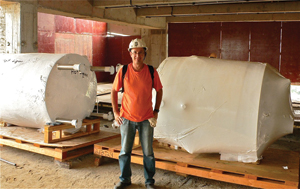by Ry Beville
Back in September, I had the pleasure of spending an evening out in Tokyo hoisting pints with Ed Tringali. Readers of this year’s winter edition (issue #5) may remember him as the person who originally trained the Swan Lake brewing team. But as I was interpreting a conversation between Ed and Aoki of Popeye, I quickly realized that he possessed encyclopedic knowledge of the craft beer industry as a whole, not just brewing. It was rare to see Aoki listen so intently to someone else’s advice, too. I had my own curiosities and questions, which I posed to him later.
What did you do during your early tenure in Japan, when the craft beer industry was just starting out?
My main responsibility was to commission equipment and get the brewery up and running. Then I provided award-winning recipes and taught the staff as much as I could about brewing quality beers consistently. However, when I first started consulting it was soon apparent that the earlier I was involved in a project–before all the decisions were made–the better it would be for the brewery. In many cases my job getting things running would be easier and the clients money would be spent more wisely. Specifically, when I could give actionable input on the the floor plan, what equipment was purchased and any customization, the client always ended up with a smarter, more user friendly brewery. If you haven’t worked in a brewery, it’s hard to realize the importance of a good sloped floor, proper ventilation and all the different options when choosing equipment. The efficient flow of raw materials, both in and out, is something that must be considered too.
What was your background/experience before coming to Japan?
I was the brew master of Big Time Brewing Co. in Seattle, a popular and successful brewpub. I also attended several brewing courses at the Siebel Institute and UC Davis. Prior to that I was briefly an assistant at a California brewpub and an avid home brewer.
What is the biggest hurdle that the Japanese craft beer market faces from your perspective?
I would say profitability, gaining market share and increasing efficiency. I would really like to see the Japanese government reduce the tax rate for small brewers. A two-tier tax rate similar to that in the US where the first 5 million liters are taxed at a much lower rate would go a long way in stimulating the craft beer segment of the industry and have no effect on government coffers.
Please tell me a little about rice beers, which are popping up all over Japan. What are the issues with brewing with rice?
Brewing with rice remains intriguing for me, particularly if the goal is to add another dimension to a beer by using a small quantity (less than 10%) and not where it is to lessen the cost of the product, as is the case with some industrial lagers being made today (rice is cheaper than malted barley). However, in order to effectively use rice it needs to be boiled to gelatinize the starch and render it readily convertible by the natural enzymes present in a malted barley mash. This would be best accomplished with a dedicated, steam jacketed rice cooker with a mechanical mixer in the brewhouse. However most small brewers using rice get by with boiling it in their kettle, mixing with an oar or paddle and transferring to the mash tun midway through their main malted barley mash. I should point out that if a brewer is interested in using rice they should seek out broken or damaged rice. It’s much more attractively priced than grade A table rice and doesn’t make a bit of difference as it gets liquefied anyway. Brewers also sometimes add rice hulls (husks) to wheat beer mashes where the percentage of wheat is in excess of 50% and they are having difficulty lautering. The rice hulls make the mash bed more permeable and thus easier to lauter. In essence they compensate for the lack of husks in wheat. I’ve always wanted to design and add a rice cooker to one of my projects but haven’t yet had the opportunity. I can think of no better place to do it than Japan. Maybe if I’m fortunate enough to work in Japan again and get involved early enough, it will become a reality.

This article was published in Japan Beer Times # () and is among the limited content available online. Order your copy through our online shop or download the digital version from the iTunes store to access the full contents of this issue.



